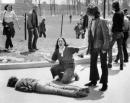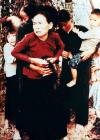Bless the beasts and the children
For in this world they have no voice
They have no choice
Bless the beasts and the children
For the world can never be
The world they see
Light their way
When the darkness surrounds them
Give them love
Let it shine all around them
Bless the beasts and the children
Give them shelter from the storm
Keep them safe
Keep them warm
Light their way
When the darkness surrounds them
Give them love
Let it shine all around them
Bless the beasts and the children
Give them shelter from the storm
Keep them safe
Keep them warm
The children
The children
The children
For in this world they have no voice
They have no choice
Bless the beasts and the children
For the world can never be
The world they see
Light their way
When the darkness surrounds them
Give them love
Let it shine all around them
Bless the beasts and the children
Give them shelter from the storm
Keep them safe
Keep them warm
Light their way
When the darkness surrounds them
Give them love
Let it shine all around them
Bless the beasts and the children
Give them shelter from the storm
Keep them safe
Keep them warm
The children
The children
The children
Contributed by Dead End - 2012/7/4 - 15:04
Language: Italian
Versione italiana di Lela Mee
BENEDICI GLI ANIMALI E I BAMBINI
Benedici gli animali e i bambini
Perché in questo mondo loro non hanno voce
Non hanno scelta
Benedici gli animali e i bambini
Perché il mondo non può mai essere
Il mondo che loro vedono
Illumina la loro via
Quando l’oscurità li circonda
Dà loro amore
Lascialo risplendere tutto attorno a loro
Benedici gli animali e i bambini
Dà loro riparo dalla tempesta
Tienili al sicuro
Tienili al caldo
Illumina la loro via
Quando l’oscurità li circonda
Dà loro amore
Lascialo risplendere tutto attorno a loro
Benedici gli animali e i bambini
Dà loro riparo dalla tempesta
Tienili al sicuro
Tienili al caldo
I bambini
I bambini
I bambini
Benedici gli animali e i bambini
Perché in questo mondo loro non hanno voce
Non hanno scelta
Benedici gli animali e i bambini
Perché il mondo non può mai essere
Il mondo che loro vedono
Illumina la loro via
Quando l’oscurità li circonda
Dà loro amore
Lascialo risplendere tutto attorno a loro
Benedici gli animali e i bambini
Dà loro riparo dalla tempesta
Tienili al sicuro
Tienili al caldo
Illumina la loro via
Quando l’oscurità li circonda
Dà loro amore
Lascialo risplendere tutto attorno a loro
Benedici gli animali e i bambini
Dà loro riparo dalla tempesta
Tienili al sicuro
Tienili al caldo
I bambini
I bambini
I bambini
Contributed by Lela Mee - 2015/4/21 - 20:37
×
![]()
Note for non-Italian users: Sorry, though the interface of this website is translated into English, most commentaries and biographies are in Italian and/or in other languages like French, German, Spanish, Russian etc.




Scritta e composta da Barry De Vorzon e Perry Botkin Jr. per la colonna sonora dell’omonimo film diretto da Stanley Kramer.
“Bless the Beasts and Children” è la trasposizione cinematografica di un racconto dello scrittore americano Glendon Fred Swarthout (1918-1992) nel quale protagonisti sono alcuni adolescenti problematici che vengono spediti dai genitori ad un campo estivo il cui inquietante motto è "Send us a boy - we'll send you a cowboy". I ragazzini vengono subito presi di mira dagli altri ospiti ed isolati. Nel campo gli animatori impongono quotidianamente attività virili e nemmeno tanto ludiche tutte incentrate sul confronto fisico, sull’affermazione dei più forti, sulla conquista e la spoliazione dei perdenti. Ovviamente i nostri all’inizio soccombono ma un giorno, dopo essere stati trascinati ad assistere all’uccisione di alcuni bisonti catturati, decidono di passare all’azione e, nottetempo, scappano dal campo per andare a liberare i bisonti rimasti. Il libro – non so se anche il film – si conclude tragicamente: le bestie non ne vogliono sapere di essere liberate, il leader dei “disadattati” muore fuggendo agli inseguitori e gli altri ragazzini vengono riacciuffati…
Presentato in competizione al Festival di Berlino, “Bless the Beasts and Children” fu inevitabilmente letto come un’allusione ai massacri della Kent University o di My Lai, come una condanna della guerra in Vietnam e della “cultura della pistola” e della violenza che permeava la società americana.
Elements of popular culture appear throughout the novel. The radios that accompany the Bedwetters during their mission constantly blare the latest hits in Motown and rock music. Westerns, with their cowboy heroics, in part provide the appeal of the adventure for the boys. On one night in particular, the Bedwetters escape to the local drive-in to see The Professionals. Swarthout does not select this film by accident; it has relevance to the boys' struggles, as it recounts the story of four misfit cowboys crossing the desert on a doomed mission to free a kidnapped woman. Allusions to television programs and to hippies also reflect the boys' awareness of the surrounding culture.
In addition, Swarthout speaks to the growing influence of environmentalism and animal rights during this time in the United States. The buffalo killings Swarthout depicts in this novel truly happened. The publication of this novel resulted in an outcry of public support to end the shootings, and the press responded with several articles. The government altered its methods slightly, but did not terminate the killing. Swarthout also demonstrates his appreciation for the natural world through his descriptions of the Arizona landscape. Environmentalism became a very powerful movement in the late 1960s, with the cultural trend to "get back to the land" and to embrace the natural world.
Glendon Swarthout's own son attended Hidden Valley Ranch for Boys, a camp for affluent boys that provided the basis for the author's depiction of the Box Canyon Boys Camp. Both a camper and a counselor at Hidden Valley Ranch, Miles Swarthout recounted his experiences to his father. Recognizing the power of his experiences and their adaptability to a literary context, Swarthout began to reconstruct and elaborate upon what his son had told him. He even dedicated the novel to his son, writing, "For Miles, who was there, and told me." Swarthout also completed lengthy research on the psychological problems of adolescent boys to create the main characters, each of whom has a distinct psychological problem. Swarthout pays particular attention to these problems in his italicized passages that elaborate on the characters' backgrounds.
William Golding's “Lord of the Flies”, written in 1954, provides the most apparent literary comparison to Bless the Beasts and Children. However, it differs from it in essential ways, and provides more of a response than an agreement with Golding's conceptions of man and beast. Swarthout himself asserted, "This book has the idea that people are not bestial in nature. It is just the opposite of Lord of the Flies. The idea is, if you isolate boys with the right combination of circumstances, they will do great things. So much is now anti-hero. This is a 'yes' book." (fonte. Sparknotes)